Marketing Essentials: Cadbury, Nestle, Marketing Mix and STP Approach
VerifiedAdded on 2023/02/01
|10
|938
|75
Report
AI Summary
This report provides an overview of marketing essentials, focusing on the marketing mix, different tactics employed by organizations, and the STP (Segmentation, Targeting, Positioning) approach. The report uses Cadbury and Nestle as case studies to compare their marketing strategies, including product offerings, pricing, and promotional activities. It examines Cadbury's marketing plan, vision, and mission, and contrasts its approach with Nestle's. The analysis covers demographic and behavioral segmentation, targeting strategies, and product positioning in the market. The conclusion emphasizes the importance of departmental coordination for organizational success and the role of marketing plans in achieving desired objectives. References to relevant marketing literature are included, providing a solid foundation for the analysis.

Marketing Essentials
Paraphrase This Document
Need a fresh take? Get an instant paraphrase of this document with our AI Paraphraser
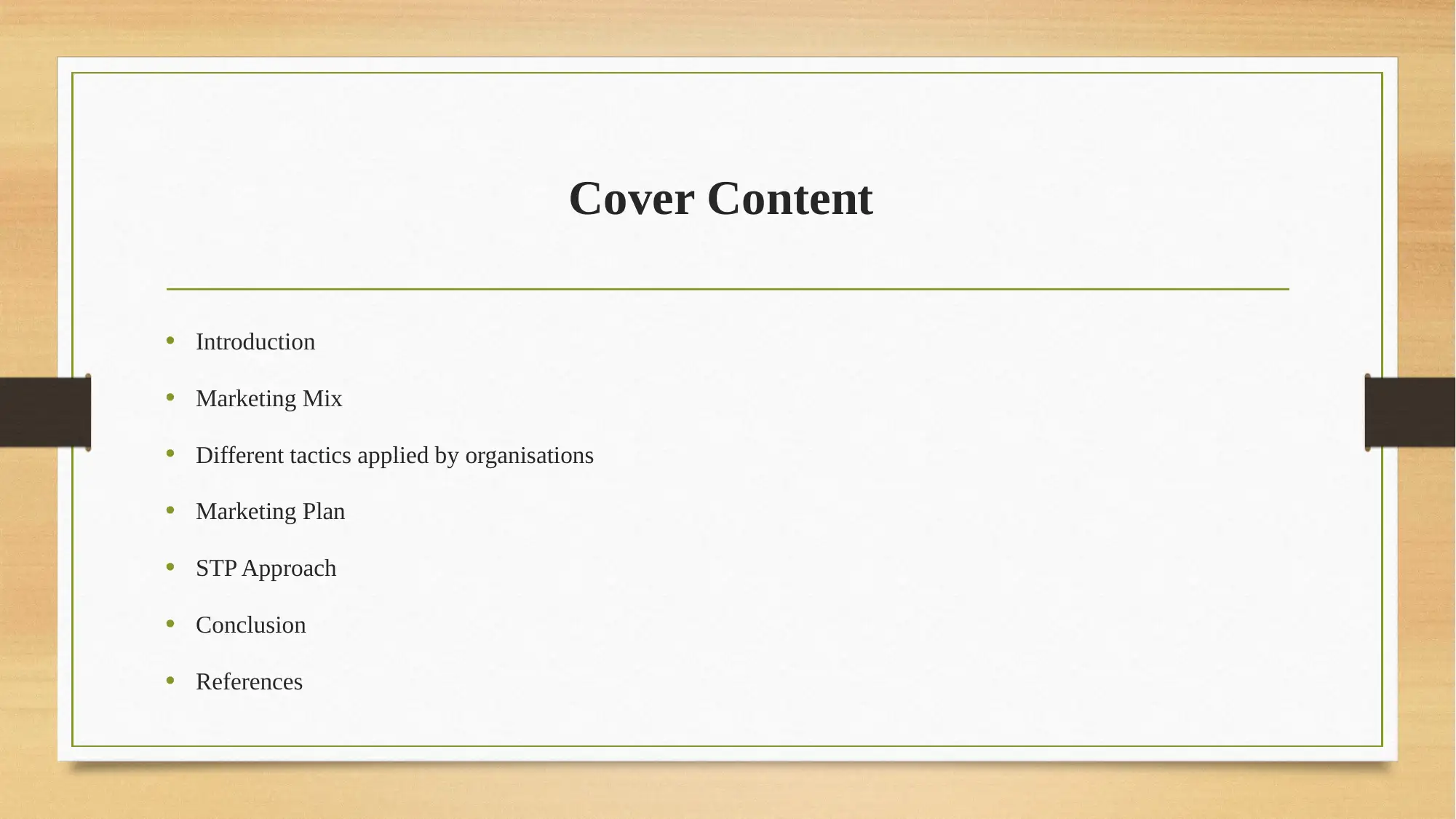
Cover Content
• Introduction
• Marketing Mix
• Different tactics applied by organisations
• Marketing Plan
• STP Approach
• Conclusion
• References
• Introduction
• Marketing Mix
• Different tactics applied by organisations
• Marketing Plan
• STP Approach
• Conclusion
• References
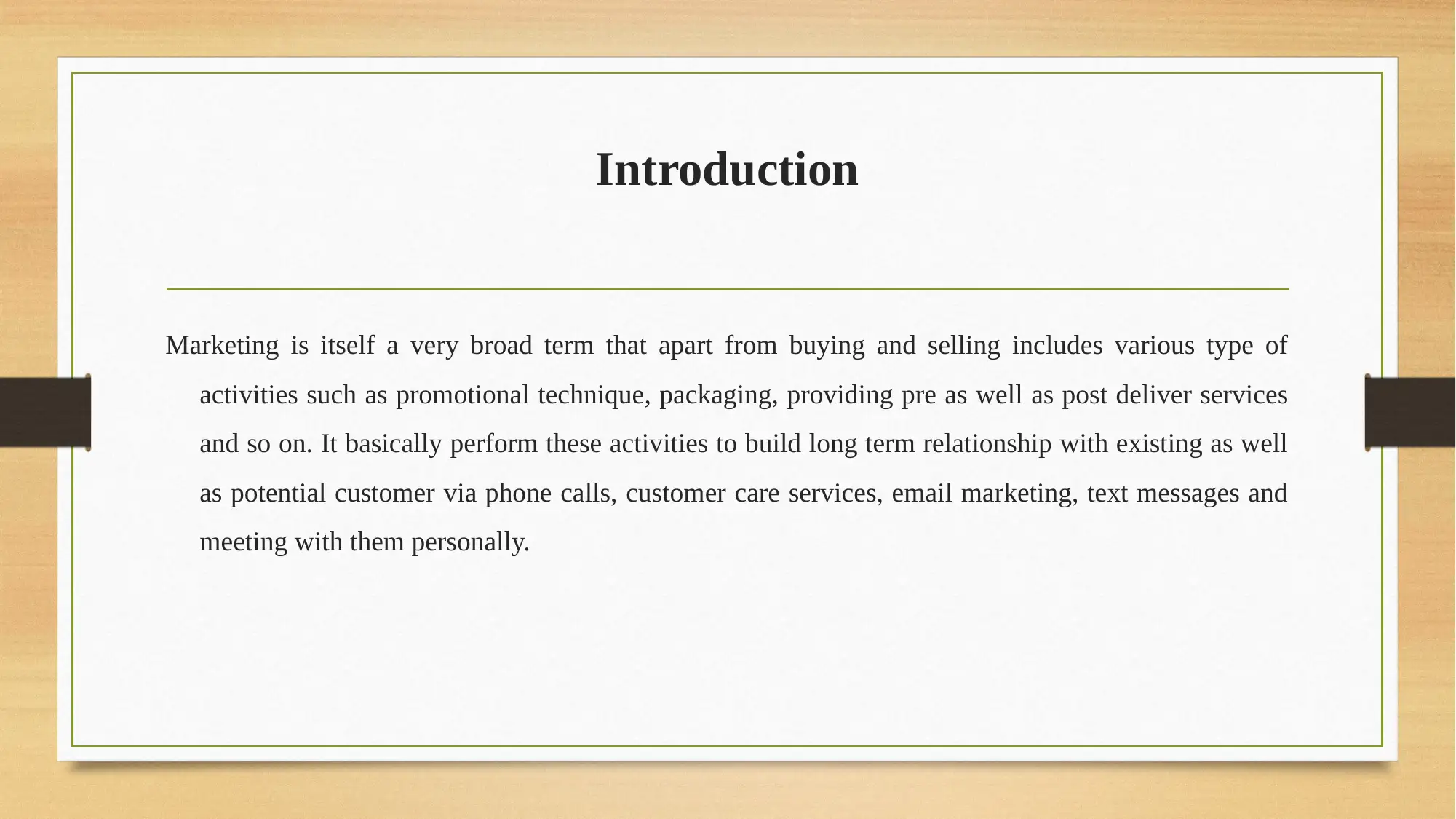
Introduction
Marketing is itself a very broad term that apart from buying and selling includes various type of
activities such as promotional technique, packaging, providing pre as well as post deliver services
and so on. It basically perform these activities to build long term relationship with existing as well
as potential customer via phone calls, customer care services, email marketing, text messages and
meeting with them personally.
Marketing is itself a very broad term that apart from buying and selling includes various type of
activities such as promotional technique, packaging, providing pre as well as post deliver services
and so on. It basically perform these activities to build long term relationship with existing as well
as potential customer via phone calls, customer care services, email marketing, text messages and
meeting with them personally.
⊘ This is a preview!⊘
Do you want full access?
Subscribe today to unlock all pages.

Trusted by 1+ million students worldwide
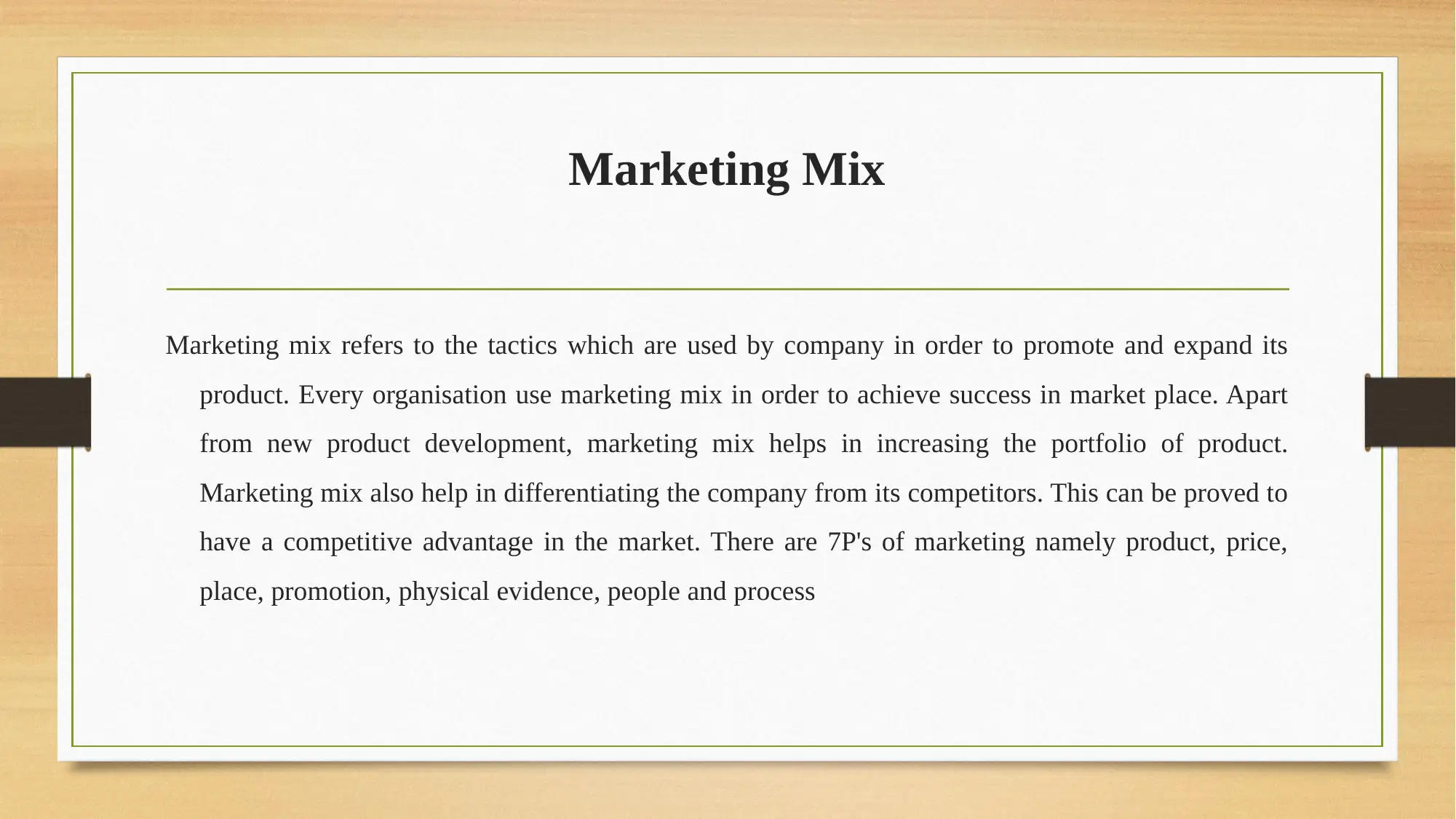
Marketing Mix
Marketing mix refers to the tactics which are used by company in order to promote and expand its
product. Every organisation use marketing mix in order to achieve success in market place. Apart
from new product development, marketing mix helps in increasing the portfolio of product.
Marketing mix also help in differentiating the company from its competitors. This can be proved to
have a competitive advantage in the market. There are 7P's of marketing namely product, price,
place, promotion, physical evidence, people and process
Marketing mix refers to the tactics which are used by company in order to promote and expand its
product. Every organisation use marketing mix in order to achieve success in market place. Apart
from new product development, marketing mix helps in increasing the portfolio of product.
Marketing mix also help in differentiating the company from its competitors. This can be proved to
have a competitive advantage in the market. There are 7P's of marketing namely product, price,
place, promotion, physical evidence, people and process
Paraphrase This Document
Need a fresh take? Get an instant paraphrase of this document with our AI Paraphraser
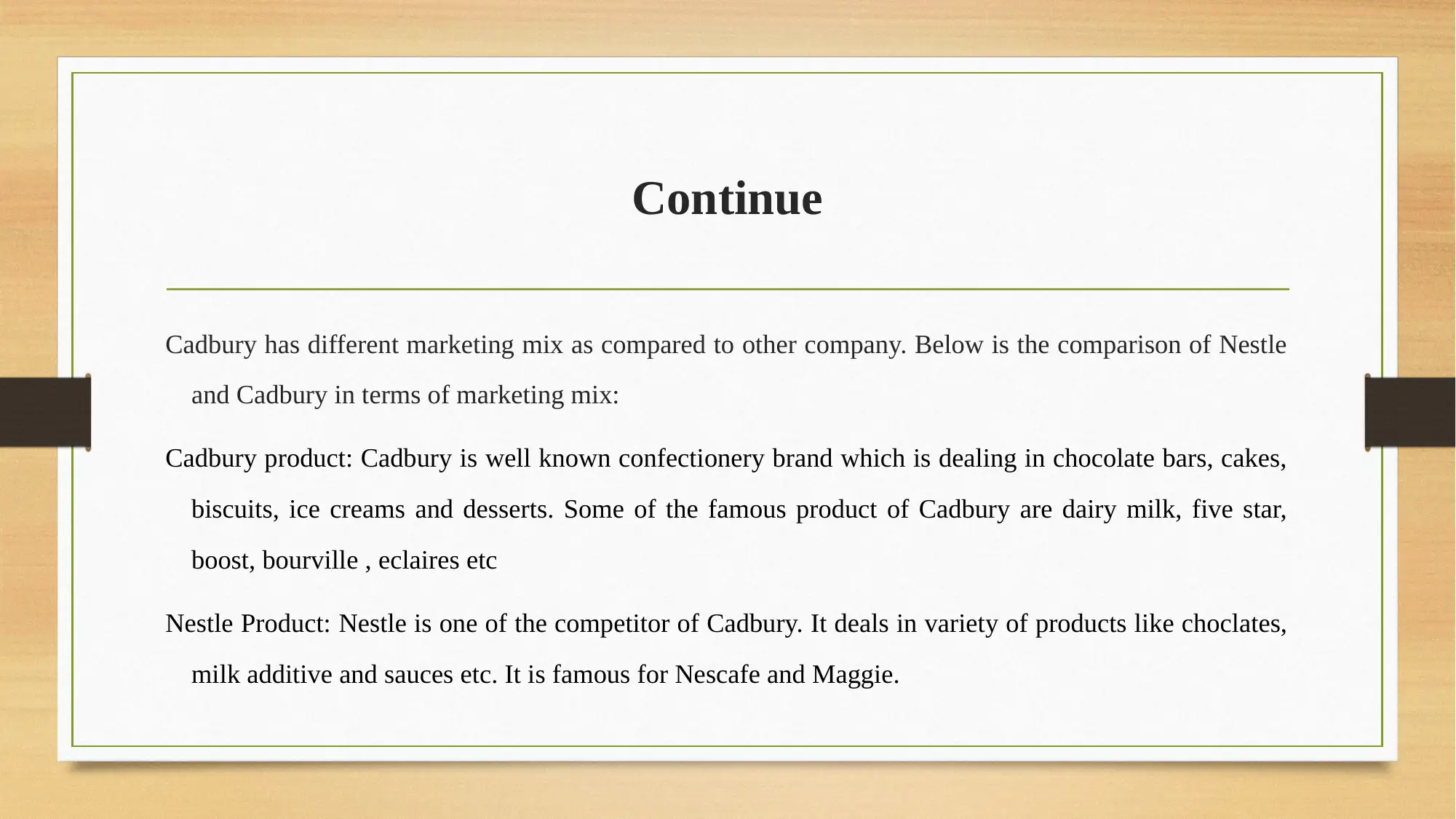
Continue
Cadbury has different marketing mix as compared to other company. Below is the comparison of Nestle
and Cadbury in terms of marketing mix:
Cadbury product: Cadbury is well known confectionery brand which is dealing in chocolate bars, cakes,
biscuits, ice creams and desserts. Some of the famous product of Cadbury are dairy milk, five star,
boost, bourville , eclaires etc
Nestle Product: Nestle is one of the competitor of Cadbury. It deals in variety of products like choclates,
milk additive and sauces etc. It is famous for Nescafe and Maggie.
Cadbury has different marketing mix as compared to other company. Below is the comparison of Nestle
and Cadbury in terms of marketing mix:
Cadbury product: Cadbury is well known confectionery brand which is dealing in chocolate bars, cakes,
biscuits, ice creams and desserts. Some of the famous product of Cadbury are dairy milk, five star,
boost, bourville , eclaires etc
Nestle Product: Nestle is one of the competitor of Cadbury. It deals in variety of products like choclates,
milk additive and sauces etc. It is famous for Nescafe and Maggie.
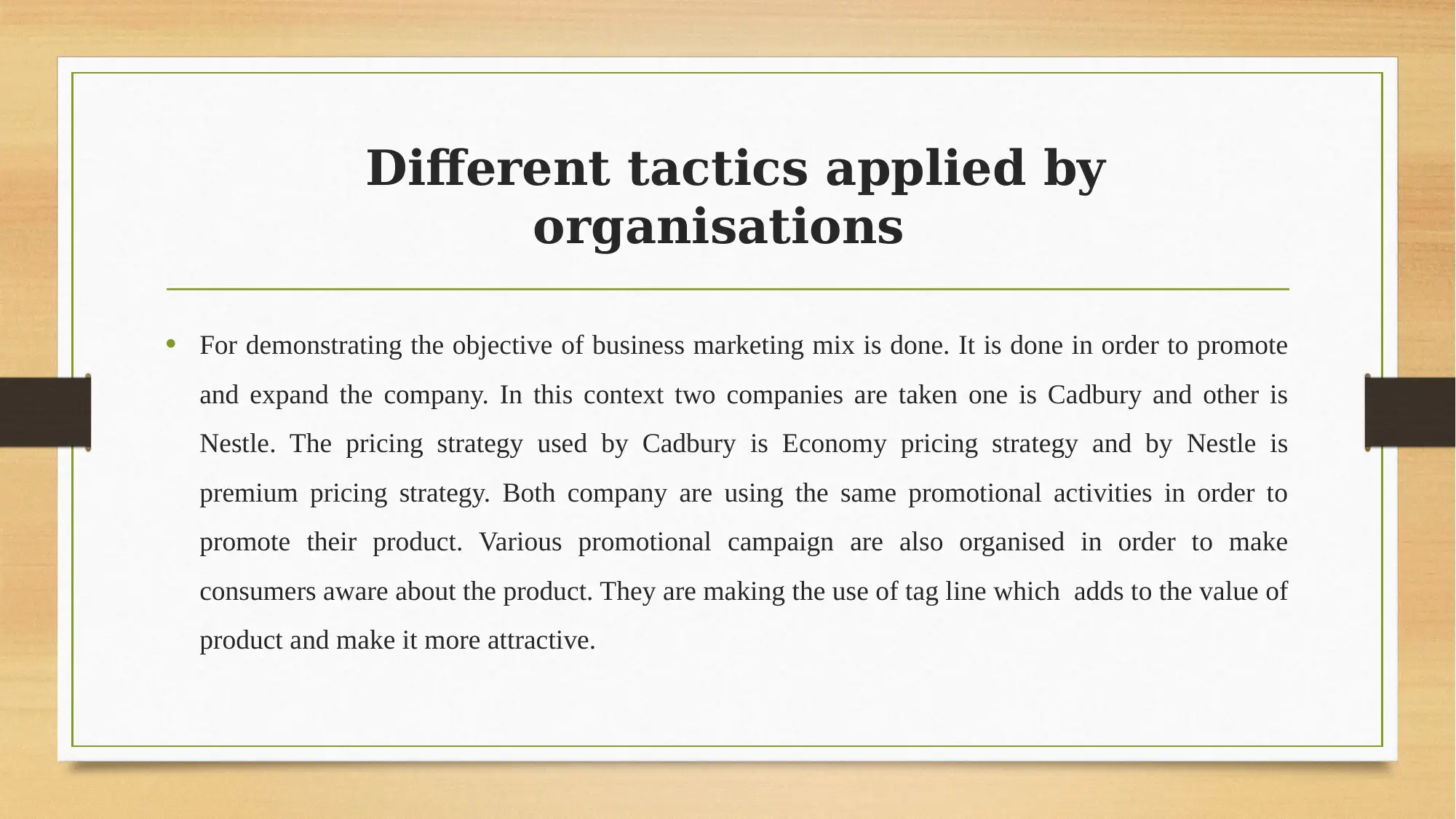
Different tactics applied by
organisations
• For demonstrating the objective of business marketing mix is done. It is done in order to promote
and expand the company. In this context two companies are taken one is Cadbury and other is
Nestle. The pricing strategy used by Cadbury is Economy pricing strategy and by Nestle is
premium pricing strategy. Both company are using the same promotional activities in order to
promote their product. Various promotional campaign are also organised in order to make
consumers aware about the product. They are making the use of tag line which adds to the value of
product and make it more attractive.
organisations
• For demonstrating the objective of business marketing mix is done. It is done in order to promote
and expand the company. In this context two companies are taken one is Cadbury and other is
Nestle. The pricing strategy used by Cadbury is Economy pricing strategy and by Nestle is
premium pricing strategy. Both company are using the same promotional activities in order to
promote their product. Various promotional campaign are also organised in order to make
consumers aware about the product. They are making the use of tag line which adds to the value of
product and make it more attractive.
⊘ This is a preview!⊘
Do you want full access?
Subscribe today to unlock all pages.

Trusted by 1+ million students worldwide
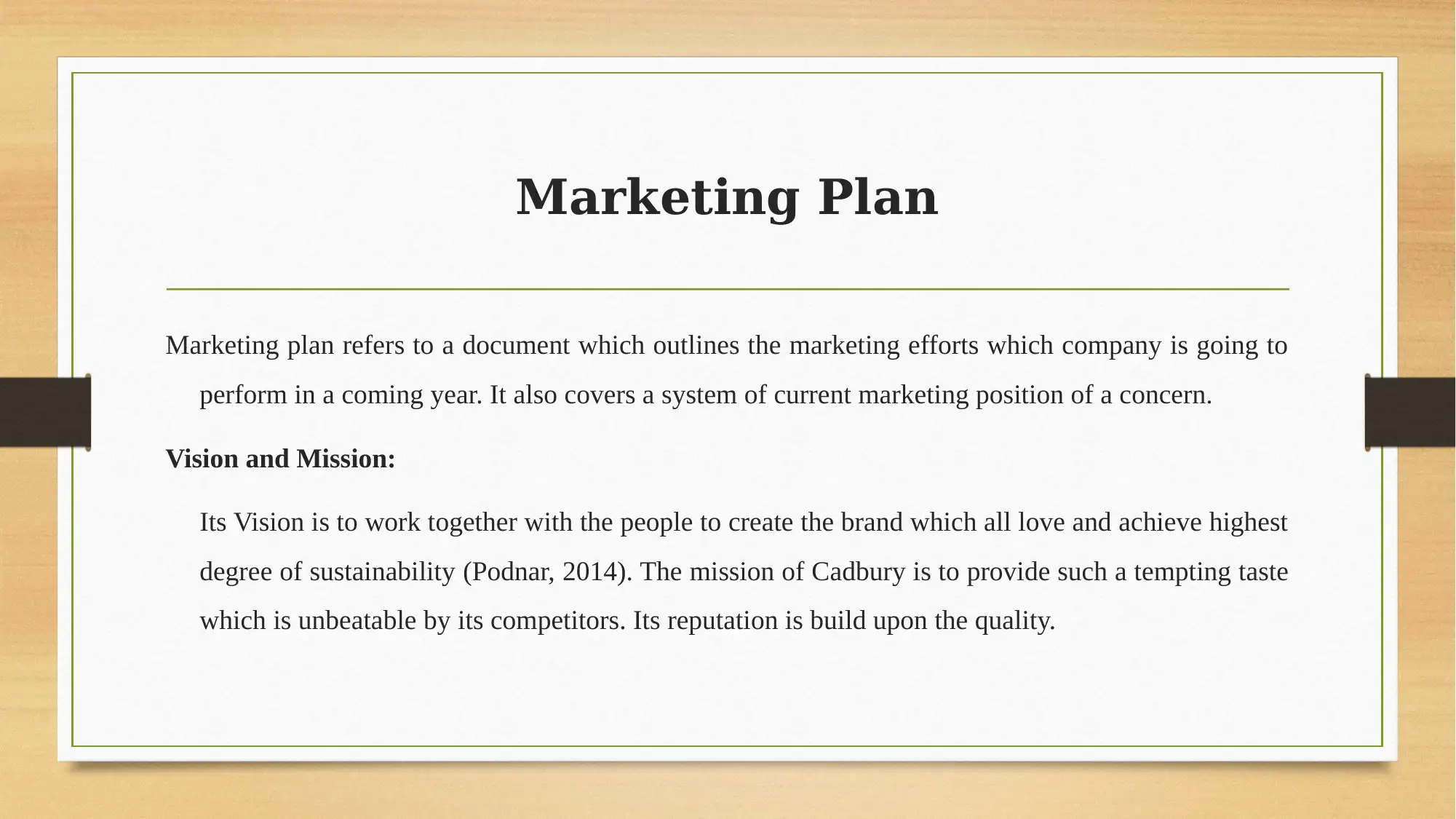
Marketing Plan
Marketing plan refers to a document which outlines the marketing efforts which company is going to
perform in a coming year. It also covers a system of current marketing position of a concern.
Vision and Mission:
Its Vision is to work together with the people to create the brand which all love and achieve highest
degree of sustainability (Podnar, 2014). The mission of Cadbury is to provide such a tempting taste
which is unbeatable by its competitors. Its reputation is build upon the quality.
Marketing plan refers to a document which outlines the marketing efforts which company is going to
perform in a coming year. It also covers a system of current marketing position of a concern.
Vision and Mission:
Its Vision is to work together with the people to create the brand which all love and achieve highest
degree of sustainability (Podnar, 2014). The mission of Cadbury is to provide such a tempting taste
which is unbeatable by its competitors. Its reputation is build upon the quality.
Paraphrase This Document
Need a fresh take? Get an instant paraphrase of this document with our AI Paraphraser
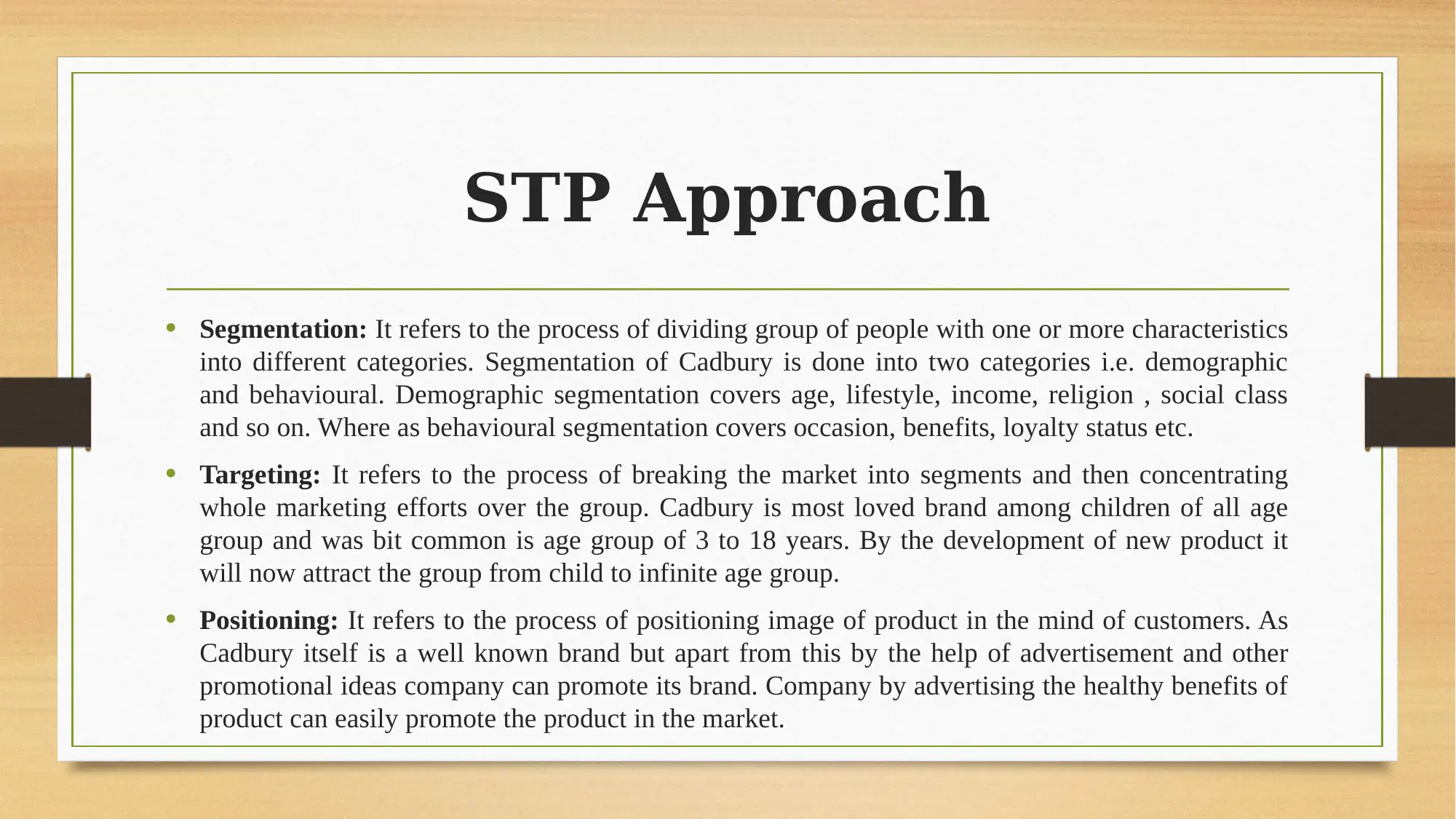
STP Approach
• Segmentation: It refers to the process of dividing group of people with one or more characteristics
into different categories. Segmentation of Cadbury is done into two categories i.e. demographic
and behavioural. Demographic segmentation covers age, lifestyle, income, religion , social class
and so on. Where as behavioural segmentation covers occasion, benefits, loyalty status etc.
• Targeting: It refers to the process of breaking the market into segments and then concentrating
whole marketing efforts over the group. Cadbury is most loved brand among children of all age
group and was bit common is age group of 3 to 18 years. By the development of new product it
will now attract the group from child to infinite age group.
• Positioning: It refers to the process of positioning image of product in the mind of customers. As
Cadbury itself is a well known brand but apart from this by the help of advertisement and other
promotional ideas company can promote its brand. Company by advertising the healthy benefits of
product can easily promote the product in the market.
• Segmentation: It refers to the process of dividing group of people with one or more characteristics
into different categories. Segmentation of Cadbury is done into two categories i.e. demographic
and behavioural. Demographic segmentation covers age, lifestyle, income, religion , social class
and so on. Where as behavioural segmentation covers occasion, benefits, loyalty status etc.
• Targeting: It refers to the process of breaking the market into segments and then concentrating
whole marketing efforts over the group. Cadbury is most loved brand among children of all age
group and was bit common is age group of 3 to 18 years. By the development of new product it
will now attract the group from child to infinite age group.
• Positioning: It refers to the process of positioning image of product in the mind of customers. As
Cadbury itself is a well known brand but apart from this by the help of advertisement and other
promotional ideas company can promote its brand. Company by advertising the healthy benefits of
product can easily promote the product in the market.
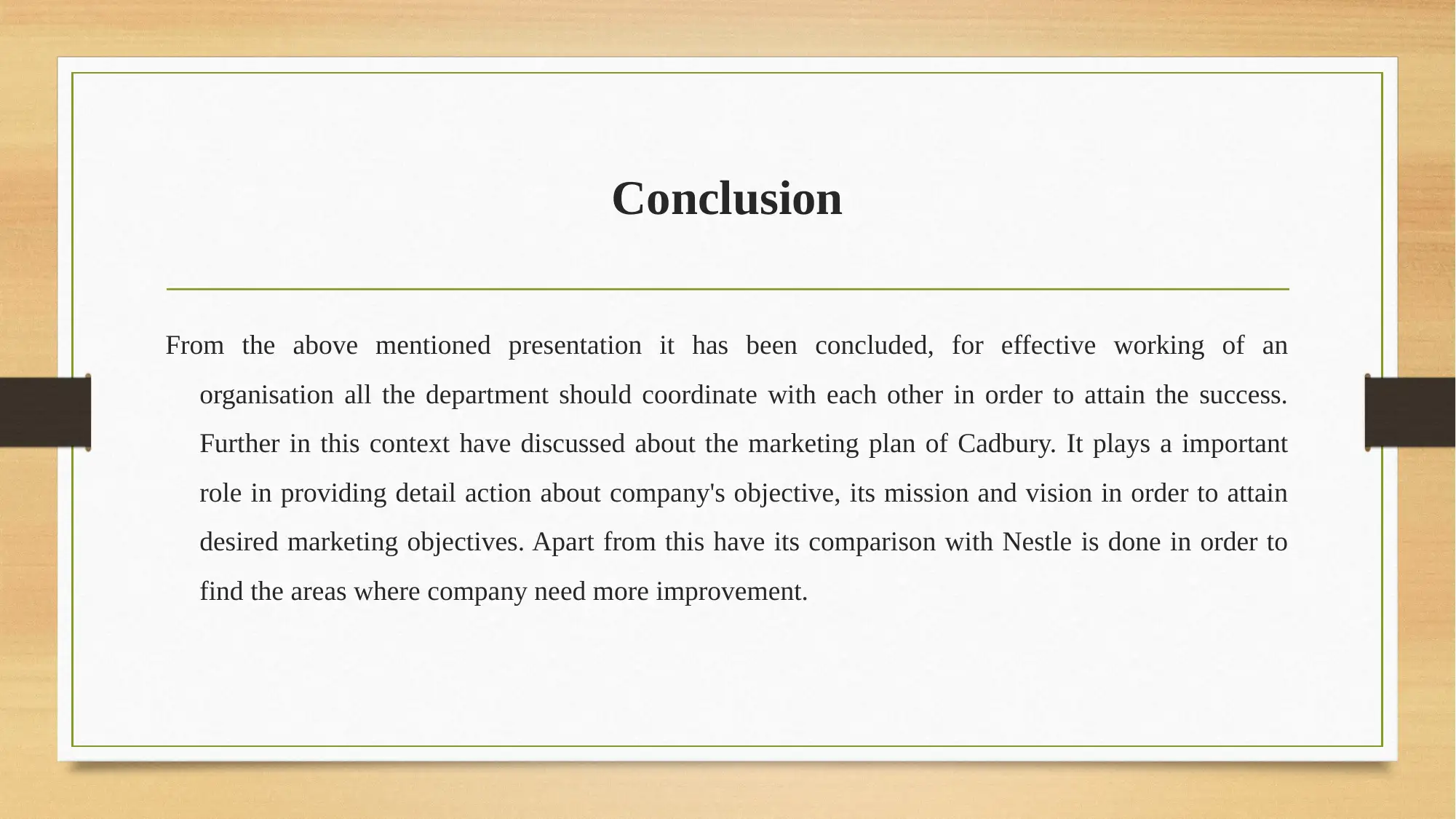
Conclusion
From the above mentioned presentation it has been concluded, for effective working of an
organisation all the department should coordinate with each other in order to attain the success.
Further in this context have discussed about the marketing plan of Cadbury. It plays a important
role in providing detail action about company's objective, its mission and vision in order to attain
desired marketing objectives. Apart from this have its comparison with Nestle is done in order to
find the areas where company need more improvement.
From the above mentioned presentation it has been concluded, for effective working of an
organisation all the department should coordinate with each other in order to attain the success.
Further in this context have discussed about the marketing plan of Cadbury. It plays a important
role in providing detail action about company's objective, its mission and vision in order to attain
desired marketing objectives. Apart from this have its comparison with Nestle is done in order to
find the areas where company need more improvement.
⊘ This is a preview!⊘
Do you want full access?
Subscribe today to unlock all pages.

Trusted by 1+ million students worldwide
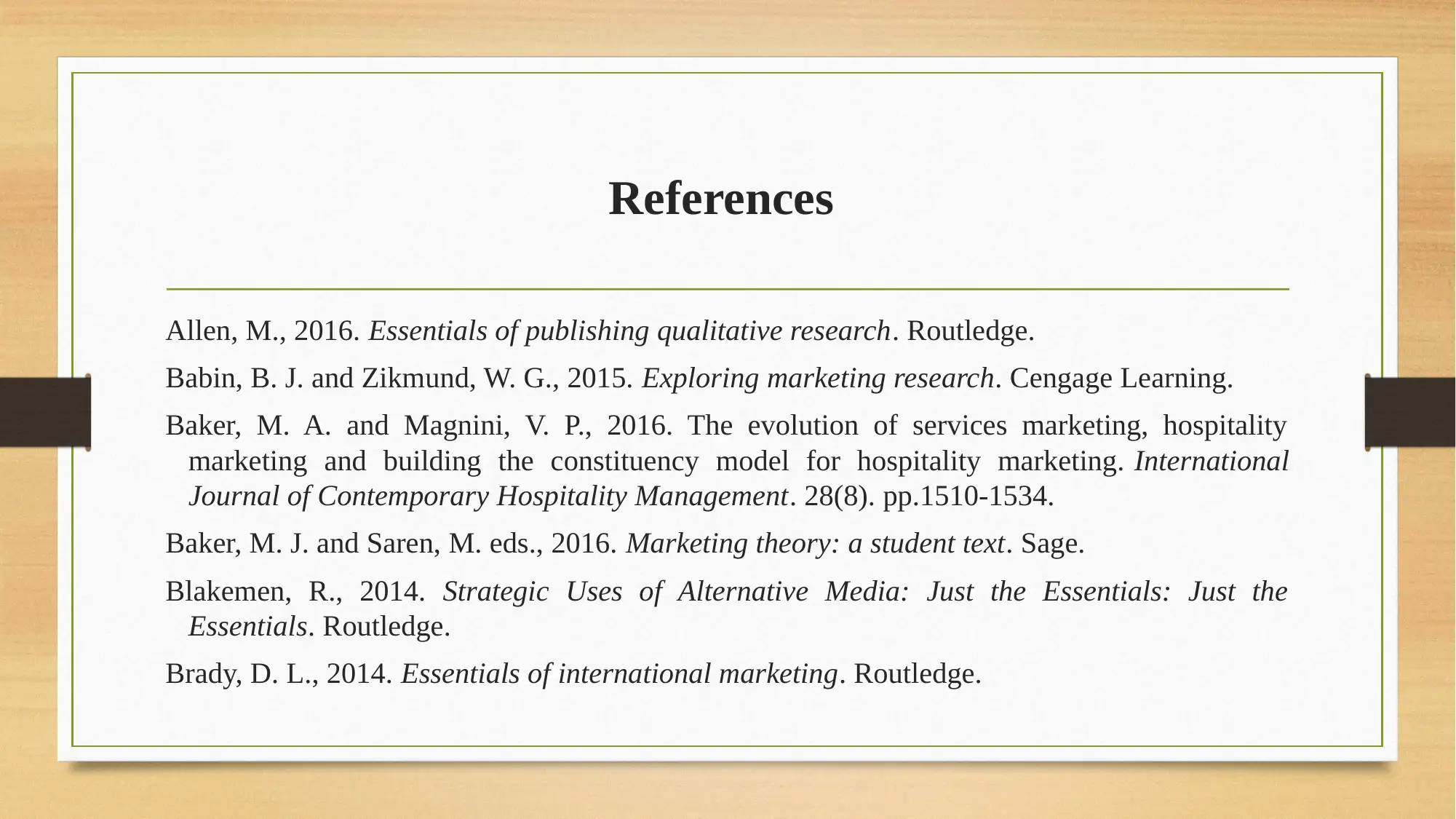
References
Allen, M., 2016. Essentials of publishing qualitative research. Routledge.
Babin, B. J. and Zikmund, W. G., 2015. Exploring marketing research. Cengage Learning.
Baker, M. A. and Magnini, V. P., 2016. The evolution of services marketing, hospitality
marketing and building the constituency model for hospitality marketing. International
Journal of Contemporary Hospitality Management. 28(8). pp.1510-1534.
Baker, M. J. and Saren, M. eds., 2016. Marketing theory: a student text. Sage.
Blakemen, R., 2014. Strategic Uses of Alternative Media: Just the Essentials: Just the
Essentials. Routledge.
Brady, D. L., 2014. Essentials of international marketing. Routledge.
Allen, M., 2016. Essentials of publishing qualitative research. Routledge.
Babin, B. J. and Zikmund, W. G., 2015. Exploring marketing research. Cengage Learning.
Baker, M. A. and Magnini, V. P., 2016. The evolution of services marketing, hospitality
marketing and building the constituency model for hospitality marketing. International
Journal of Contemporary Hospitality Management. 28(8). pp.1510-1534.
Baker, M. J. and Saren, M. eds., 2016. Marketing theory: a student text. Sage.
Blakemen, R., 2014. Strategic Uses of Alternative Media: Just the Essentials: Just the
Essentials. Routledge.
Brady, D. L., 2014. Essentials of international marketing. Routledge.
1 out of 10
Related Documents
Your All-in-One AI-Powered Toolkit for Academic Success.
+13062052269
info@desklib.com
Available 24*7 on WhatsApp / Email
![[object Object]](/_next/static/media/star-bottom.7253800d.svg)
Unlock your academic potential
Copyright © 2020–2026 A2Z Services. All Rights Reserved. Developed and managed by ZUCOL.





